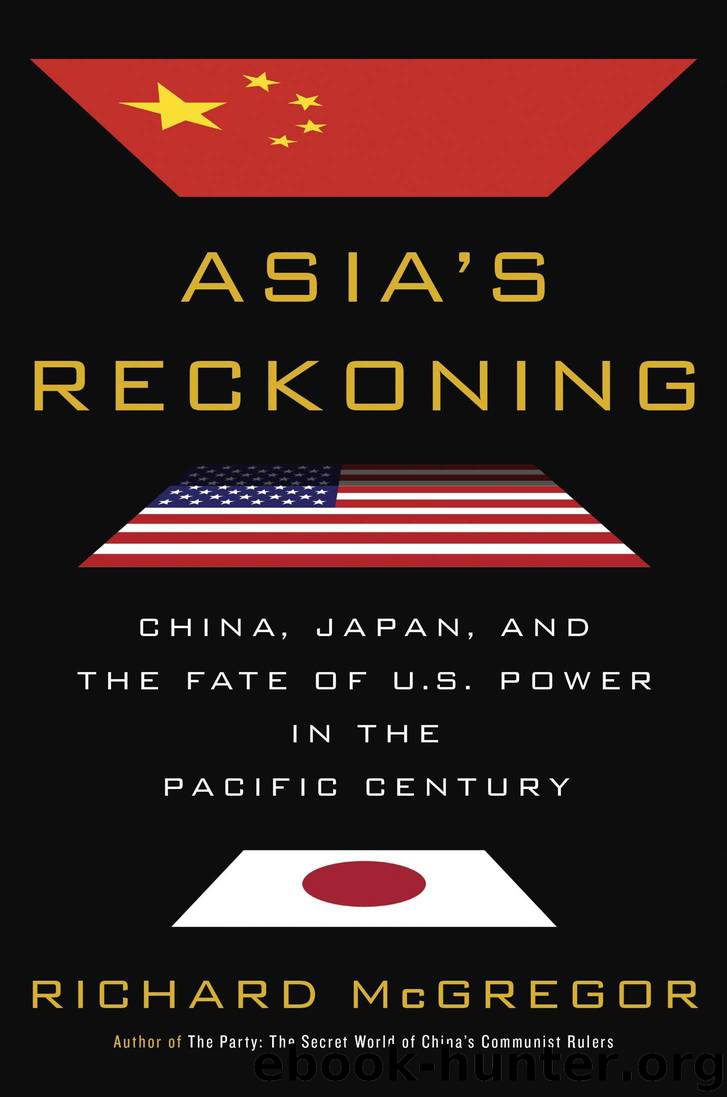Asia's Reckoning: China, Japan, and the Fate of U.S. Power in the Pacific Century by Richard McGregor

Author:Richard McGregor [McGregor, Richard]
Language: eng
Format: azw3
Publisher: Penguin Publishing Group
Published: 2017-09-05T04:00:00+00:00
CHAPTER TEN
The Ampo Mafia
Trust me.
—Yukio Hatoyama, to Barack Obama, on Okinawa
Large-scale deep-water rigs are our mobile national territory and a strategic weapon.
—Wang Yilin, Chinese state oil executive
Whenever he led delegations to see Hu Jintao, Yuji Miyamoto made a practice of standing last in line when saying farewell. It was a small diplomatic ruse that Tokyo’s ambassador in Beijing used to get Hu’s attention and grab a few precious words with the Chinese leader. In early 2008, waiting until his delegation trailed out ahead of him, Miyamoto found Hu seemingly almost as anxious to talk to him as he was to the president. Hu was scheduled to travel to Japan a few months later, in May. “Hu grabbed my arm,” Miyamoto recalled, “and told me he was really concerned about his visit and wanted to convey his wishes to Fukuda.”
Hu was the most pro-Japan of Chinese leaders, and Yasuo Fukuda, now prime minister, the most pro-China of Japanese leaders. The pair had a potentially transformative deal on their agenda. Instead of fighting over the East China Sea, Tokyo and Beijing were negotiating a deal to develop its underwater resources together. Yet Hu was worried that he might have to cancel his visit, which had been minutely choreographed for months in advance, because of political controversy in Japan. This particular clash didn’t involve the usual suspects that had traditionally upended bilateral ties, such as the history wars or territorial disputes or Chinese military maneuvers. As if to underline how fragile the relationship had become, the two leaders, and their respective diplomats, were flailing over poisoned dumplings.
It had taken years for Japan to persuade China to enter into talks on how they should divide up the oil and gas reserves both believed lay beneath the ocean. Their fishing fleets had shared the waters for more than a century. In the 1950s, when the two nations didn’t have diplomatic ties, they still met to negotiate fishing rights and how to handle boats and their crews confiscated for straying into each other’s territory. It wasn’t until the late 1960s, when the United Nations surveyed the seas for resources around the Senkaku/Diaoyu Islands, that their competition extended to include oil and gas. For both resource-poor Japan and a China that had become an oil importer in the early 1990s, the prospect of hydrocarbons on their doorstep was a potential game changer. So, too, was a possible deal between the two countries to share it. A deal over oil could also mean a truce over their territorial disputes in the East China Sea.
The diplomats from both nations began talks in 2004 with powerful interests at home applying pressure on their delegations. It wasn’t just politicians with a strong nationalistic bent who were shadowing the talks; their respective militaries were watching closely as well. They also had to deal with the local energy companies, which were eager to obtain as big a share of the potential wealth as they could. Should China start production before the two sides
Download
This site does not store any files on its server. We only index and link to content provided by other sites. Please contact the content providers to delete copyright contents if any and email us, we'll remove relevant links or contents immediately.
| Africa | Americas |
| Arctic & Antarctica | Asia |
| Australia & Oceania | Europe |
| Middle East | Russia |
| United States | World |
| Ancient Civilizations | Military |
| Historical Study & Educational Resources |
The Sympathizer by Viet Thanh Nguyen(4385)
The Rape of Nanking by Iris Chang(4203)
World without end by Ken Follett(3474)
Ants Among Elephants by Sujatha Gidla(3463)
Blood and Sand by Alex Von Tunzelmann(3195)
Japanese Design by Patricia J. Graham(3167)
The Queen of Nothing by Holly Black(2587)
City of Djinns: a year in Delhi by William Dalrymple(2554)
Foreign Devils on the Silk Road: The Search for the Lost Treasures of Central Asia by Peter Hopkirk(2463)
India's Ancient Past by R.S. Sharma(2451)
Inglorious Empire by Shashi Tharoor(2437)
Tokyo by Rob Goss(2427)
In Order to Live: A North Korean Girl's Journey to Freedom by Yeonmi Park(2386)
Tokyo Geek's Guide: Manga, Anime, Gaming, Cosplay, Toys, Idols & More - The Ultimate Guide to Japan's Otaku Culture by Simone Gianni(2367)
India's biggest cover-up by Dhar Anuj(2350)
The Great Game: On Secret Service in High Asia by Peter Hopkirk(2344)
Goodbye Madame Butterfly(2250)
Batik by Rudolf Smend(2179)
Living Silence in Burma by Christina Fink(2068)
